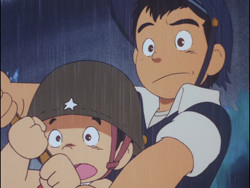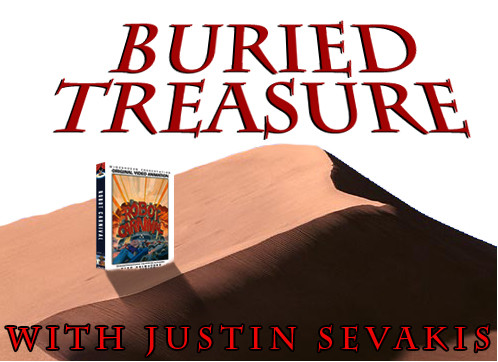Buried Treasure
Barefoot Gen
by Justin Sevakis,
There are a surprising number of anime features that deal with the plight of Japanese children during World War II. It's a subject that seems engineered for Japanese storytelling, these tales that mix nostalgia with pathos and lost innocence, and it's no surprise that those who grew up during that tumultuous era would wish to tell their children and grandchildren what they'd gone through. Of these films, most people have only heard of Grave of the Fireflies, and there's a good reason for that: it's the best one by far, both in terms of artistry and storytelling. There's also Who's Left Behind?, Rail of the Star, and probably a few others I'm missing.
But besides Grave of the Fireflies and its tempered, sensitive depiction of children at wartime, there is another anime feature that no fan of the medium should miss. It takes a notably different tack and a less subtle one: covering the actual atomic bombing of Hiroshima, and pulling absolutely no punches. And yet, I have a feeling that many fans simply wouldn't be able to handle watching it.
 Barefoot Gen is horrifying. It's incredibly hard to watch, and possibly impossible to watch without being deeply affected. It's incredibly provocative and blunt in its portrayal the events of the atomic bomb that destroyed Hiroshima and killed over a hundred thousand. And really, with subject matter like that, not being bluntly honest would do a disservice to the memory of that day.
Barefoot Gen is horrifying. It's incredibly hard to watch, and possibly impossible to watch without being deeply affected. It's incredibly provocative and blunt in its portrayal the events of the atomic bomb that destroyed Hiroshima and killed over a hundred thousand. And really, with subject matter like that, not being bluntly honest would do a disservice to the memory of that day.
Gen the middle child in a fairly typical middle-class family living in Hiroshima. He's an energetic kid, and can usually be seen roughhousing with his little brother Shinji. They're both excited about the war (and just CONVINCED they're going to whup the Americans' behinds), but the reality of the situation is a little tense. There's little food available, the government rations aren't anywhere near enough, and with their mother pregnant this is becoming a bigger and bigger problem. There are also regular air raids, though many of them are false alarms. So far, Hiroshima has been spared any major damage, and Gen and his siblings live a peaceful, fun-filled life.
 And then... the bomb falls. It is perhaps one of the single most disturbing events in world history, and its depiction in this movie can only be described as one of the most disturbing sequences ever animated. The fire rages. People cook and then disintegrate. A mother, in the three seconds it takes her to immolate and dissolve, collapses in an instinctive pose to protect her baby, who nonetheless shares her fate. A dog barks and holds onto a fence and is soon little more than charred meat dangling from a fence.
And then... the bomb falls. It is perhaps one of the single most disturbing events in world history, and its depiction in this movie can only be described as one of the most disturbing sequences ever animated. The fire rages. People cook and then disintegrate. A mother, in the three seconds it takes her to immolate and dissolve, collapses in an instinctive pose to protect her baby, who nonetheless shares her fate. A dog barks and holds onto a fence and is soon little more than charred meat dangling from a fence.
Miraculously, just at the moment the bomb hit, Gen had ducked behind a wall to pick up a rock. Upon standing back up, the girl next to him at school's face is gone. Terrified, Gen runs back home to find his house collapsed and burning, and his family trapped in the rubble. He's able to get help and pull his mother to safety, but the rest of his family are not so lucky. His father, in searing pain, tells him to take his mother somewhere safe. Together, the two of them tearfully obey as the rest of their family is consumed by fire.
 See what I mean by not pulling any punches? It's not a film that most people would want to watch over and over. Eventually things start to improve for Gen and what's left of his family (he and his mother soon adopt an orphan who looks almost identical to Shinji), but their situation remains incredibly desperate. The film is essentially a tale of survival, and in the case of an atomic bomb blast, surviving the explosion itself by no means guarantees surviving its after effects. And let's not forget that his mother is still pregnant.
See what I mean by not pulling any punches? It's not a film that most people would want to watch over and over. Eventually things start to improve for Gen and what's left of his family (he and his mother soon adopt an orphan who looks almost identical to Shinji), but their situation remains incredibly desperate. The film is essentially a tale of survival, and in the case of an atomic bomb blast, surviving the explosion itself by no means guarantees surviving its after effects. And let's not forget that his mother is still pregnant.
Watching Barefoot Gen can hardly be considered "fun". Aside from its wrenching intensity, it's easy to be thrown by its sudden changes in tone, and the unending bleakness of the situation Gen, his mother, and Shinji II find themselves in. Nonetheless it's an experience that feels important in a way anime seldom can. No matter how otherworldly the events of the film, they did happen. In animated form, we're allowed to personalize the experience, to understand it, and to live it in a way that would be difficult, if not impossible, with a live action work.
 The film was based on an autobiographical manga series by Keiji Nakazawa, which is considered a seminal work in Japan despite its sometimes rough artwork. The manga has the distinction of being one of the first manga titles ever to be released in English (a volunteer organization released a 4-volume English edition in 1976), and San Francisco-based publisher Last Gasp is currently finishing its release of a new 10-volume edition featuring an introduction by Maus creator Art Spiegelman (who cites the work as a companion to his own). The books are quite popular among educational professionals, but clearly they're of limited appeal to the typical manga buyer. There was also a live action adaptation made in 1976, which I haven't seen. The animated version, an early Madhouse work, was released in 1983 and features a screenplay adaptation by Nakazawa himself.
The film was based on an autobiographical manga series by Keiji Nakazawa, which is considered a seminal work in Japan despite its sometimes rough artwork. The manga has the distinction of being one of the first manga titles ever to be released in English (a volunteer organization released a 4-volume English edition in 1976), and San Francisco-based publisher Last Gasp is currently finishing its release of a new 10-volume edition featuring an introduction by Maus creator Art Spiegelman (who cites the work as a companion to his own). The books are quite popular among educational professionals, but clearly they're of limited appeal to the typical manga buyer. There was also a live action adaptation made in 1976, which I haven't seen. The animated version, an early Madhouse work, was released in 1983 and features a screenplay adaptation by Nakazawa himself.
The film has its flaws, and foremost among them are the visuals: they're quite rough, and come from the thick-lined, low cel-count school of 70s anime (though the film was made in 1983). Kids are lumpy looking and cartoonish, and fit into the fun, rambunctious moments better than the serious ones. Aside from its dated visuals, the Japanese voice track leaves quite a bit to be desired. Gen and Shinji are both voiced by real children, and these children are pretty clearly not actors. They shout their lines in a monotone, but few of their dramatic moments come off as believable. The track also doesn't seem to have been preserved in a format better than the final optical audio from the film prints, so it's in mono and incredibly scratchy and low-fidelity. There is an English dub, though it's not reproduced on the Geneon DVD, that was produced in the mid 90s by Carl Macek for Streamline Pictures. It sounds a lot better technically, but regrettably this dub is also not one of his better ones (and features a Shinji that is decidedly lower voiced than his older brother). I honestly have trouble deciding which audio track annoys me less, but the Japanese track is at least more authentic.
Barefoot Gen is required viewing for those who take animation seriously. It's an experience few will enjoy, but anyone would remember. It's a traumatic experience that allows us to better understand history, and the pain of others. And those connections, unsubtle as they are, are what make us human. It might be easy to forget those boring high school history lessons, but the images of Barefoot Gen will stay etched in your memory for the rest of your life.

| Obscure-O-Meter™ | |
| A | Abundant. Available anywhere that carries anime. |
| C | Common. In print, and always available online. |
| R1 | US release out of print, still in stock most places. |
| R2 | US release out of print, not easy to find. |
| R3 | Import only, but it has English on it. |
| R4 | Import only. Fansubs commonly available. |
| R5 | Import only, and out of print. Fansubs might be out there. |
| R6 | Import long out of print. No fansubs are known to exist. |
| R7 | Very rare. Limited import release or aired on TV with no video release. No fansubs known to exist. |
| R8 | Never been on the market. Almost impossible to obtain. |
| Adapted from Soviet-Awards.com. | |
Where to get it:
The Geneon DVD of Barefoot Gen is the one to find, since it includes the sequel and decent subtitles. The video quality is also quite decent. Though out of print (unlike most of the rest of the Geneon catalog, it has not been license rescued), there are still a few shops online that have it in stock at roughly its original retail price. There are also Australian and UK versions in print and available quite cheaply. Image released a DVD of the Streamline dub early in 1999 or so, and though it does have the Japanese audio, it features dubtitles, rendered in a blinding pink-on-magenta font. This disc is also quite easy to find.
The Geneon DVD also features the sequel, Barefoot Gen 2, though this film is more about the war orphans than the immediate impact of the bomb. It's worth watching, but has nowhere near the impact of the original.
discuss this in the forum (46 posts) |
this article has been modified since it was originally posted; see change history
